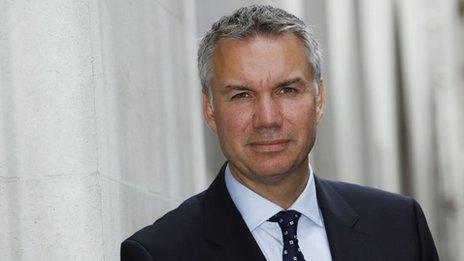Euan Sutherland on why he quit the Co-op Group
- Published
- comments

I have spoken to Euan Sutherland about why he quit as chief executive of the Co-operative Group.
And he insisted that his resignation had been long considered, even though he had only been in the job for just over ten months.
What tipped him over the edge was the disclosure to the Observer newspaper of his £3m-per-year pay package, but he saw it as just the latest manifestation of a determination by some elected Co-op officials to frustrate his attempt to reform the way the group is run, its governance.
"The senior democrats [as elected Co-op officials are often called] talk the talk of reform, but in practice they won't do it," he told me.
What appears to have annoyed him most was regular leaks of the big strategic moves planned by the group - such as its sale of farms and likely disposal of pharmacies - which he saw as an attempt to foment dissent.
I can't really complain about these leaks, since I was a beneficiary. But I can see it from his point of view.
His hope therefore is that by resigning and highlighting that the group is a long way from mended (it still needs to reassure the banks that it is reducing large debts of £1.5bn, it has promised the Bank of England to inject £260m into Co-op Bank), the change to management structure he believes necessary will now happen.
"My hope is that from the resignation will come healthy reform," he said.
Pride
He had three other things he wanted to get off his chest.
First, he insisted that a quartet of senior executives led by him - including the finance director Richard Pennycook, who has replaced Mr Sutherland temporarily - were "there for the pride of revitalising the Co-op".
He added: "We want it become a campaigning organisation again, especially in communities. And it has to be for more than just the 600 activists, but also for the millions of members and customers".
And here we get to the heart of his critique of the organisational structure of Co-op Group. He is concerned that too much of the benefit of the group goes to those who get elected to the Co-op's regional boards and local area committees, and not enough to the five million members and customers.
"Who is the Co-op for? Is it for the 600 activists, the 90,000 employees or the millions of members and customers?" he asked. "In my view it is for all of them."
His plea, he said, was therefore for the group to implement the reforms to the management structure and governance being prepared by Lord Myners, the former fund manager and erstwhile City minister.
The thrust of those reforms would be to empower the group's executives and - to an extent - marginalise the elected officials.
However, Mr Sutherland denied that he had been trying to rush through the changes. "I was committed to take through the reforms at the pace that the democrats [elected officials] wanted."
But that required some movement by those elected officials. And he increasingly feared that they did not want fundamental change at all.